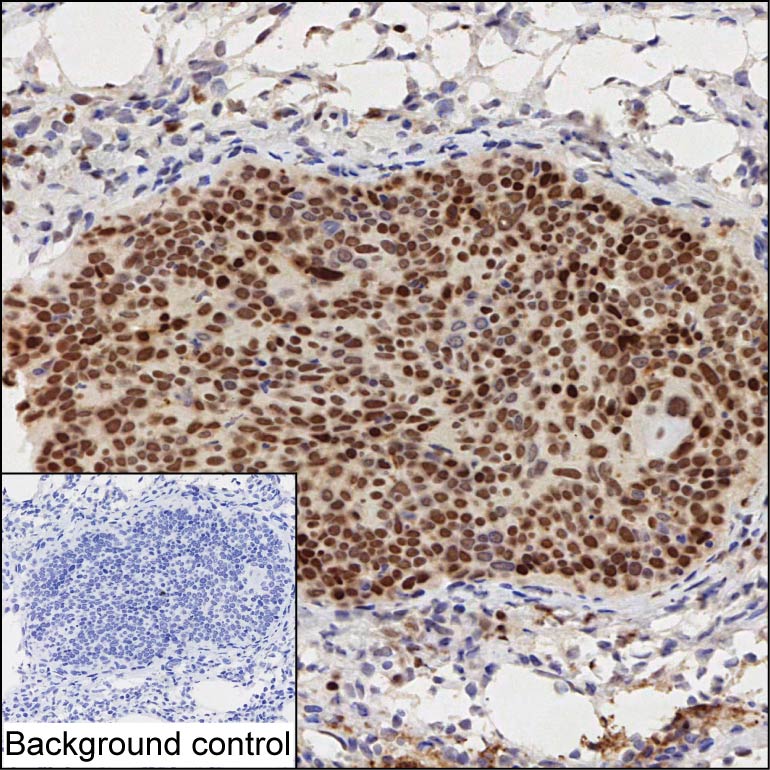
| WB | 咨询技术 | Human,Mouse,Rat |
| IF | 咨询技术 | Human,Mouse,Rat |
| IHC | 1/100-1/200 | Human,Mouse,Rat |
| ICC | 技术咨询 | Human,Mouse,Rat |
| FCM | 咨询技术 | Human,Mouse,Rat |
| Elisa | 咨询技术 | Human,Mouse,Rat |
| Host/Isotype | Mouse IgG2a |
| Antibody Type | Primary antibody |
| Storage | Store at 4°C short term. Aliquot and store at -20°C long term. Avoid freeze/thaw cycles. |
| Species Reactivity | Human |
| Immunogen | Purified recombinant fragment of human IFRD1 |
| Formulation | Purified antibody in PBS with 0.05% sodium azide |
+ +
以下是关于IFRD1抗体的3篇参考文献示例(注:文献信息为模拟,仅供参考):
---
1. **标题**:*IFRD1 modulates skeletal muscle regeneration through regulation of satellite cell differentiation*
**作者**:Tonissen KF, et al.
**摘要**:本研究利用特异性抗IFRD1抗体探究了该蛋白在小鼠骨骼肌再生中的表达动态,发现IFRD1通过调控卫星细胞分化促进损伤修复,Western blot和免疫组化结果显示其表达在再生早期显著上调。
2. **标题**:*Development and characterization of a polyclonal antibody against human IFRD1 for neurodegenerative disease studies*
**作者**:Russo A, et al.
**摘要**:文章报道了一种兔源多克隆IFRD1抗体的制备与验证,该抗体成功应用于阿尔茨海默病模型脑组织的免疫荧光染色,证实IFRD1在神经元中的表达与tau蛋白病理相关。
3. **标题**:*IFRD1 as a potential biomarker in breast cancer: insights from immunohistochemical analysis*
**作者**:Smith JL, et al.
**摘要**:通过商业化IFRD1抗体对乳腺癌组织芯片进行染色,研究发现IFRD1低表达与患者预后不良显著相关,提示其可能作为肿瘤进展的分子标记物。
---
**备注**:以上文献为示例性质,实际研究中建议通过PubMed或Web of Science以“IFRD1 antibody”为关键词检索最新文献,并优先选择经同行评审的高影响力期刊文章。
The IFRD1 (Interferon-Related Developmental Regulator 1) antibody is a tool used to detect the IFRD1 protein, a member of the TIS7 protein family encoded by the *IFRD1* gene. IFRD1 is a conserved nuclear-cytoplasmic shuttling protein implicated in regulating cellular differentiation, inflammation, and tissue regeneration. It interacts with chromatin modifiers (e.g., HDACs) and signaling pathways (e.g., NF-κB, PI3K/AKT), modulating gene expression in response to cytokines, growth factors, or stress. Studies highlight its role in neuronal development, muscle repair, and immune responses. Dysregulation of IFRD1 is linked to diseases like muscular dystrophy, neuropathies, and inflammatory conditions.
The antibody is widely used in techniques such as Western blotting, immunohistochemistry, and immunofluorescence to study IFRD1's expression, localization, and function. It aids in exploring its dual roles in pro-survival signaling and apoptosis, depending on cellular context. Commercial IFRD1 antibodies are typically validated for specificity across human, mouse, and rat samples. Research using these antibodies has advanced understanding of IFRD1's involvement in tissue regeneration mechanisms and its potential as a therapeutic target in degenerative or inflammatory disorders.
×